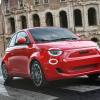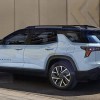
The Chevy Bolt and Nissan Leaf Are Headed in Opposite Directions
The race to dominate the electric vehicle market is heating up, and two cars are leading the charge: the Chevrolet Bolt and Nissan Leaf. However, despite both being electric vehicles, these two models couldn’t be more different in terms of their recent performance.
While one is making significant strides and gaining popularity, the other is struggling to keep up and falling behind. It’s a tale of two EVs, and the differences are stark. So, what exactly is happening with the Chevy Bolt and Nissan Leaf? Let’s take a closer look.

The Chevy Bolt surges ahead, while the Nissan Leaf falls behind
When it comes to the electric vehicle market, the Chevy Bolt and Nissan Leaf are two of the most well-known and popular models. However, in terms of GoodCarBadCar‘s year-to-date sales numbers, these two vehicles are headed in completely opposite directions. The Chevy Bolt has seen a significant surge in sales recently, with 19,700 units sold this year.
On the other hand, the Nissan Leaf has only sold 2,353 units this year, a sharp decrease compared to previous years. It’s important to note that the future of the electric vehicle market is still uncertain, and both the Chevy Bolt and Nissan Leaf have their own unique strengths and weaknesses.
However, in terms of year-to-date sales, it’s clear that the Bolt is currently outpacing the Leaf by a significant margin.
Sales figures tell a tale of two electric vehicles: the Chevy Bolt and the Nissan Leaf
The year-to-date sales numbers for the Chevy Bolt and Nissan Leaf could not be more different, and the story they tell about these two models is striking.
The Bolt’s surge in sales could be attributed to its impressive range of 259 miles on a single charge, as well as its quick acceleration and spacious interior. Additionally, Chevy has invested heavily in marketing the Bolt, highlighting its status as an affordable and eco-friendly option in the electric vehicle market.
On the other hand, the Nissan Leaf’s decrease in sales could be due to several factors, including the vehicle’s shorter range of 149 miles on a single charge and a lack of substantial updates to the model in recent years.
Additionally, Nissan has not invested as heavily in marketing the Leaf, which could be contributing to its declining sales. These numbers highlight the divergent trajectories of the Bolt and Leaf in the EV market.
The Bolt’s success shows that consumers are increasingly interested in electric vehicles with longer ranges and more advanced features. In contrast, the Leaf’s decline in sales indicates that consumers may be looking for more innovation and updates in the electric vehicle market.
It remains to be seen how these trends will continue to evolve, but the sales numbers for the Bolt and Leaf offer a clear picture of the current state of the market.
The potential shift in Nissan’s focus and the impact on Leaf sales
The Nissan Leaf was once a trailblazer in the electric vehicle market, but with the rise of competitors and new models, its popularity has started to wane. The drop in sales for the Leaf could be attributed to Nissan’s shift in focus toward its new EV, the Ariya. With 2,860 units sold in the first quarter of 2023, the Ariya seems to be gaining traction and attention in the market.
The Ariya is a solid crossover/SUV that offers a range of impressive features, including a sleek and modern design, advanced technology, and impressive performance capabilities. However, it’s worth noting that the Ariya faced production delays due to COVID-related chip shortages and other issues, which could have impacted its initial sales numbers.
While the Ariya’s success is certainly encouraging for Nissan, seeing such a significant decrease in Leaf sales is still concerning. The Leaf was once one of the most popular EVs on the market, and its decline could indicate a shift in consumer preferences or a need for Nissan to adapt and innovate its offerings.


